Henry Cloud's Blog, page 23
May 11, 2015
Four Common Relationship Speed Bumps
Today, we’re highlighting another one of the 17 free teaching articles by Boundaries co-authors, Dr. Henry Cloud and Dr. John Townsend in the Freebies section. We encourage you to take advantage of this great material and share it with your friends.
—-
 Developing boundaries in love and relationships usually involves a learning curve as people go deeper with each other. For example, if a person just doesn’t get you or understand what you’re communicating or what behavior you need to have, don’t sweat it. It’s a speed bump – a snag, but not a derailment.
Developing boundaries in love and relationships usually involves a learning curve as people go deeper with each other. For example, if a person just doesn’t get you or understand what you’re communicating or what behavior you need to have, don’t sweat it. It’s a speed bump – a snag, but not a derailment.
The more informed you are about relational speed bumps, the more able you will be to deal with them successfully. There are some typical kinds that, once you understand them, will cover most of the obstacles you will encounter. Here are four of the most common relationship speed bumps that can happen between you and another person and what you can do about them.
Read the rest of the article here.
The post Four Common Relationship Speed Bumps appeared first on Boundaries Books.
May 7, 2015
Boundaries and the Need for a Network of Friends
Ecclesiastes 4:9-12 says, “Two are better than one, because they have a good return for their labor: If either of them falls down, one can help the other up. But pity anyone who falls and has no one to help them up. Also, if two lie down together, they will keep warm. But how can one keep warm alone? Though one may be overpowered, two can defend themselves. A cord of three strands is not quickly broken.”
Having a friend is a good thing — two can defend themselves. Having a group — “three strands” — of safe and supportive relationships is even better. The reason is simple: Having more than one friend in our lives allows us to experience different people’s gifts, abilities, and uniqueness. Gaining support and sustenance from more than one person is much more powerful than receiving from just one. It also allows our friends to be unavailable at times, to hurt and have problems of their own, to have time alone.
Having a network of friends gives us a strong support base. It allows us to be psychologically mature. Only infants, dependent on one caregiver, need just one other person. As people grow up, they begin to need more. People were created for groups, families and a “body” of others to be knitted together. Certainly one-on-one support is important, but more than one is better. Plus, when one person can’t be there for us, there’s another phone number to call. And that other person may have something very valuable to offer. This is the beauty behind the Bible’s teachings on the church, the body of Christ. We’re a group of unfinished people.
We ask for help and give help; we ask again and give again. And when our supportive network is strong enough, we all help each other mature into what God intended us to be. “Bearing with one another in love,” we strive to be unified (see Ephesians 4:2 – 3). It is the truth that a few are stronger than two. A group is an entirely different dynamic than just two people.
We can sometimes hide and excuse parts of ourselves with just one person, but it is more difficult to do with a group. We would be wise to broaden our support network to more than just one other person so we may experience all the strength God has provided for us. A great example of this is when the spouse of an addict joins a codependency group and the power of the entire group helps her take a very difficult stand and sustain it. Many families and individuals have been saved by the power present in that kind of group. Hard situations in life can be better addressed when people have a strong system of support, as this passage in Ecclesiastes attests.
 Find more insightful commentary from Drs. Henry Cloud and John Townsend in the NIV Life Journey Bible, which combines the world’s most accessible Bible translation with exclusive teaching.
Find more insightful commentary from Drs. Henry Cloud and John Townsend in the NIV Life Journey Bible, which combines the world’s most accessible Bible translation with exclusive teaching.
The post Boundaries and the Need for a Network of Friends appeared first on Boundaries Books.
May 3, 2015
Why Responsible People Enable Irresponsible People
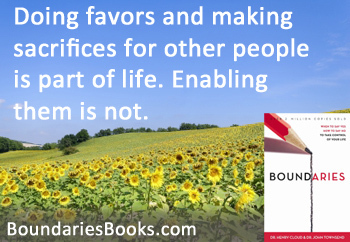 Susie was an administrative assistant in a small company that planned training sessions for different industries. She was responsible for booking the training sessions and managing the speakers’ schedules. Her coworker, Jack, was responsible for the training facilities. He took the materials to the site, set up the equipment, and ordered the food. Together, Susie and Jack made the events happen.
Susie was an administrative assistant in a small company that planned training sessions for different industries. She was responsible for booking the training sessions and managing the speakers’ schedules. Her coworker, Jack, was responsible for the training facilities. He took the materials to the site, set up the equipment, and ordered the food. Together, Susie and Jack made the events happen.
After a few months of really liking her work, though, Susie began to lose energy. Eventually, her friend and coworker, Lynda, asked her what was wrong. Susie couldn’t put her finger on the problem at first. Then she realized: The problem was Jack!
Jack had been asking Susie to “pick this up for me while you’re out,” or “please bring this box of materials to the workshop.” Slowly, Jack was shifting his responsibilities onto Susie.
“You have to stop doing Jack’s work,” Lynda told Susie. “Just do your own work and don’t worry about him.”
“But what if things go wrong?” Susie asked.
Lynda shrugged. “Then they’ll blame Jack. It’s not your responsibility.”
“Jack will be angry with me for not helping,” Susie said.
“Let him,” said Lynda. “His anger can’t hurt you as much as his poor work habits can.”
So Susie began to set limits on Jack. She told him, “I will not have time to bring the materials for you this week.” And when Jack ran out of time to do things himself, Susie said, “I’m sorry that you have not done that before now, and I understand that you are in a bind. Maybe next time you will plan better. That’s not my job.”
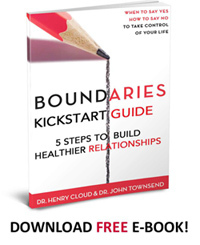 Some trainers were angry that their equipment was not set up, and customers were angry that no food was provided for the break. But the boss tracked down the problem to the person who was responsible — Jack — and told him to shape up, or find another job. In the end, Susie began to like work again, and Jack began to get more responsible. All because Susie set boundaries and stuck to them.
Some trainers were angry that their equipment was not set up, and customers were angry that no food was provided for the break. But the boss tracked down the problem to the person who was responsible — Jack — and told him to shape up, or find another job. In the end, Susie began to like work again, and Jack began to get more responsible. All because Susie set boundaries and stuck to them.
If you are being saddled with another person’s responsibilities and feel resentful, you need to take responsibility for your feelings, and realize that your unhappiness is not your coworker’s fault, but your own. As in any other boundaries conflict, you first must take responsibility for yourself.
Then you must act responsibly to your coworker. Go to your coworker and explain your situation. When he asks you to do something that is not your responsibility, say no and refuse to do whatever it is that he wants you to do. If he gets angry at you for saying no, be firm about your boundaries and empathize with his anger. Don’t get angry back. To fight anger with anger is to get hooked into his game. Keep your emotional distance and say, “I am sorry if this upsets you. But that job is not my responsibility. I hope you get it worked out.”
If he continues to argue, tell him that you are finished discussing it; he can come and find you when he is ready to talk about something else. Do not fall into the trap of justifying why you can’t do his work for him. You will be slipping into his thinking that you should do his work if you are able to, and he will try to find a way that you can. You owe no one an explanation about why you will not do something that is not your responsibility.
Many over-responsible people who work next to under-responsible people bear the consequences for their coworkers. Always covering for them, or bailing them out, they are not enjoying their work or their relationships with these people. Their lack of boundaries is hurting them, as well as keeping the other person from growing. If you are one of these people, you need to learn to set boundaries.
 Sometimes, however, a coworker will genuinely need some extra help. It is perfectly legitimate to bail out a responsible coworker, or to make special concessions to a colleague who uses those concessions responsibly to get well. This is love, and good companies operate lovingly. But if one person started taking advantage of the other, that would need to stop. Covering for the other at that point would not be helpful, but would enable a bad pattern.
Sometimes, however, a coworker will genuinely need some extra help. It is perfectly legitimate to bail out a responsible coworker, or to make special concessions to a colleague who uses those concessions responsibly to get well. This is love, and good companies operate lovingly. But if one person started taking advantage of the other, that would need to stop. Covering for the other at that point would not be helpful, but would enable a bad pattern.
Favors and sacrifices are part of life. Enabling is not. Learn to tell the difference by seeing if your giving is helping the other to become better or worse. Require responsible action out of the one who is given to. If you do not see it after a season, set boundaries.
 Ready to go deeper on this topic? Discover how to set healthy limits in any situation and prevent unnecessary burdens from controlling your peace and energy in the award-winning book, Boundaries.
Ready to go deeper on this topic? Discover how to set healthy limits in any situation and prevent unnecessary burdens from controlling your peace and energy in the award-winning book, Boundaries.
Landscape image courtesy of Dan at FreeDigitalPhotos.net
The post Why Responsible People Enable Irresponsible People appeared first on Boundaries Books.
April 30, 2015
Can You Love Someone Too Much?
For those who may not know, this website features 12 free teaching videos by Boundaries co-authors, Dr. Henry Cloud and Dr. John Townsend.
Today, we want to highlight a great video by Dr. Cloud that addresses the controversial question, “Can You Love Someone Too Much?” His video called “The Two Sides of Life” discusses the unseen balance between love and truth. Take the next 6 minutes to watch this video and learn an important secret that affects all of your relationships.
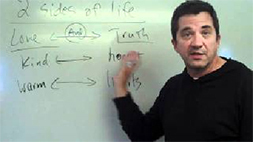
Click on the picture to view video:
The Two Sides of Life
To watch more of these insightful videos, click here.
The post Can You Love Someone Too Much? appeared first on Boundaries Books.
April 26, 2015
Setting Boundaries with Teen Substance Abuse
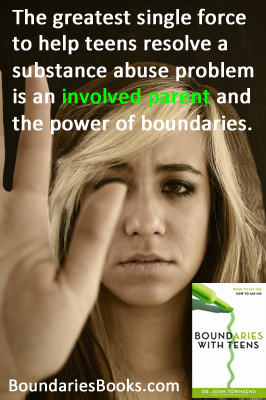 It’s every parent’s worst nightmare: having a teen hooked on alcohol or drugs. This is not life as God designed it. Substance abuse causes the breakdown of all that is good. Enslavement replaces freedom. Detachment replaces love. Chaos replaces order. Despair replaces hope.
It’s every parent’s worst nightmare: having a teen hooked on alcohol or drugs. This is not life as God designed it. Substance abuse causes the breakdown of all that is good. Enslavement replaces freedom. Detachment replaces love. Chaos replaces order. Despair replaces hope.
Many young people abuse alcohol and drugs, and this problem is not likely to go away anytime soon. I (Dr. Townsend) can’t overstate the danger of substance abuse. It can, and often does, lead to poverty, injury, disease, and death. But despite the seriousness of this problem, parents of teens with this issue need to understand that the greatest single force to help a teen resolve a substance problem is an involved parent. Boundaries with teens is designed to give you guidelines for the process.
Boundaries with Teens: Defining the Problem
Unfortunately, the teen years are a perfect fit, in a sick way, for substance abuse problems. By nature, adolescents challenge the authority and values of parents and are highly susceptible to peer approval.
They are interested in feelings and experiences, often to the neglect of good judgment, yet they can quickly become disconnected and can feel isolation deeply. Teens get easily bruised, discouraged, and hurt, and they gravitate toward quick ways to medicate the pain. No wonder the issue has become so far-reaching, particularly now that drugs are so accessible.
And they are accessible. Your teen likely knows how to get drugs if he wants them. He knows someone, or knows someone who knows someone. Be wise. Keep your head out of the sand and assume your teen has access.
If you accept this reality, it can assist you in helping your teen stay away from alcohol and drugs or in helping him recover from them.
Boundaries with Teens: Handling the Problem
You can’t control whether your teen has access to drugs and alcohol, but you can support him and help him develop the internal restraints and strength he needs to resist using substances. Here are some ways to do just that.
Establish a zero tolerance policy. Be clear with your teen that substances are not acceptable and that you will not tolerate them. Your adolescent may be hearing muddy messages from lots of other sources, including friends and some of their parents. This is a black-and-white issue, not a gray one, so be direct about your stance on alcohol and drugs.
Not only should you be forthright about your stance, but also about the consequences. Let your adolescent know ahead of time that if she uses drugs or alcohol, she will lose many valued privileges and freedoms. Not only that, but if your teen continues to use, she will have to live somewhere else, because you have a value that substance abuse will not be tolerated in your home.
I know parents who have sent their teens to a different high school to get away from drug-using friends. I know some who have sent their kids to boarding schools. Others have sent their kids to residential treatment centers. And still others have done everything they could until the teen reached majority age, and then they made her move out of the house. Many times, this was absolutely the right move to make. Such consequences may sound harsh, but only to those who are not experienced in the power and severity of drug problems. Substances are stronger than many people think, and their hold gets worse over time.
Come down hard at the first offense. If it is your teen’s first offense, resist the impulse to say, “Oh well, first time, just don’t do it again.” You will have only one first offense to deal with, and it is an opportunity to let your teen know that drugs and alcohol are not a casual deal. Otherwise, your teen may think it’s acceptable for him to use now and then.
Here are five suggestions for consequences:
1. Grounding. Grounding is a natural consequence, as your teen has shown that she can’t resist temptation with her friends, so she can’t have social contact with them for a significant period of time.
2. Supervised social contact. Allow your teen to go to social outings, including movies and parties, but only with an approved parent present. If he does not use substances during this period, he can then have more social freedom.
3. Drug testing. Home drug tests are now readily available. You can tell your teen that for the next few months you will be testing her randomly. A side benefit is that this also gives your teen an excuse not to use with friends. She can say, “I can’t smoke pot. My parents do random testing.”
4. Legal education. Some counties offer training for families in which they take teens through the court system as if they were going to jail, so that they can experience what the system would be like were they to be arrested and tried on a drug charge.
5. Service. Have your teen help out at the local rescue mission or church, doing errands, stocking the warehouse, or cleaning up. Learning the value of service often helps adolescents become open to the needs of others and can help break the self-absorption of substance use.
Boundaries with Teens: Live in the Light
Our natural inclination as parents is to give our kids the information on the dangers of drugs and then hope they make good choices. But this is not enough. While your teen needs the information, she also needs you. She is not likely to say, “Would you ask me if I’m on drugs or not?” So be the parent and ask. Teens often hope on some level that their parents will ask, because they are scared and want to talk, but they are not about to ask a parent. Take the initiative to bring out drug matters into the light of relationship.
Listen when your teen talks. Try to get to the heart of what she understands, experiences, does, and feels. If you can’t be shocked, you will be more likely to get more information. Your teen needs your viewpoint, but she also needs your ears.
 Sometimes parents avoid talking about alcohol and drugs beyond the basic “don’t do it” lecture. They think they might convey approval to the teen if they act interested in what is going on with friends and at school. Nothing could be further from the truth. Your teen is living in a drug-influenced world, whether or not she is using them. Don’t leave her alone in that world. Enter it, be curious about it, and get to know it. Find out what kids are using and where, which parents are lax about substances, and where the parties are. Your involvement doesn’t mean that you approve of drugs. It simply means you love your kid enough to get into her world.
Sometimes parents avoid talking about alcohol and drugs beyond the basic “don’t do it” lecture. They think they might convey approval to the teen if they act interested in what is going on with friends and at school. Nothing could be further from the truth. Your teen is living in a drug-influenced world, whether or not she is using them. Don’t leave her alone in that world. Enter it, be curious about it, and get to know it. Find out what kids are using and where, which parents are lax about substances, and where the parties are. Your involvement doesn’t mean that you approve of drugs. It simply means you love your kid enough to get into her world.
Of course, being connected means more than talking about drugs. It involves being in an ongoing relationship with your teen about all aspects of her life. The more you connect on all levels, the more likely your teen will talk with you about any substance problem.
Boundaries with Teens: Know Your Teen
The better you know your adolescent, the better you will know how to respond to substance problems. Get to know what vulnerabilities are particular to your teen that drugs and alcohol might exploit, and get your teen the support, assistance, and structure he needs so that he is not so susceptible. Here are some common vulnerabilities and ways you can deal with them:
a. She challenges your parenting and values. Find ways to have her safely question you that don’t involve substances. Give her room and space to not be your clone.
b. He surrenders judgment to feelings and experiences. Spend time talking with him about that. Validate his need for experience, but help him develop the ability to make sound decisions, to think about the effects of his actions, and to postpone gratification for a greater good.
c. She is easily influenced by the approval of peers. Strengthen her individuality and character. Help her to say no to others, including you. Find healthy peers who will support her in this effort.
d. He is vulnerable to others. Have him make you the bad guy until he is stronger. For example, your teen may not be able to say, “No, I don’t do drugs,” but he can say, “My parents are really strict, and they would come down so hard on me if I did that.” Not only is this statement true, but it gives your kid an out until he is firmer in his own values.
e. She disconnects and isolates quickly. Take initiative and draw her out. Be a bridge between your teen and her feelings, between herself and the world. Help her reconnect so that she doesn’t need substances to feel alive.
f. He is easily hurt and is vulnerable to attempts to cover up his pain. Comfort and support your teen so that he can connect his hurt feelings to you so that they are less intense. At the same time, help him learn to confront and be honest with others so that he is stronger inside and less vulnerable.
More than ever before, your teen needs you to know who he is. Find out what he needs, what hurts him, and what matters to him. He may resist you, but part of him wants his parent to break through at some level so that he is not alone with himself.
Remember the Druggies
In all likelihood, you were around drugs or at least had friends who were druggies when you were a teenager. Remember what potential they had? Some were smart, funny, creative, and gifted. Now think about where many of those people are today. Is that what you want for your teen’s future? If your child’s present is substance-influenced, it can easily become a substance-dominated future.
Seek help. If your teen is using alcohol or drugs, seek help. This complex problem requires much expertise, skill, and training. Fortunately, there are good counselors and teen workers who are well trained in substance problems. A good adolescent therapist can evaluate the severity of the problem and determine what structures will help the teen, ranging from counseling to an intensive detox and rehab program.
If your teen’s drug and alcohol usage has moved beyond experimentation and become a regular part of her life, she now has a dependency. She now uses substances compulsively, no matter how negative the life consequences have become. She cannot stop on her own and will need outside support and expertise.
Boundaries with Teens: Watch Out for Other Types of Dependency
Dependencies are not limited to drugs and alcohol. A teen can become a sex addict, for example, from viewing pornographic websites, and be trapped in compulsive behaviors that keep him returning to the sexual images.
These teens feel intense shame, guilt, and helplessness about their porn addictions. Youth pastors and counselors can do much to help kids deal with this issue.
In addition, some teens also have food dependencies known as eating disorders, such as anorexia, bulimia, and obesity. In such instances, eating habits and food intake become the focus of life, sometimes to the point of being life-threatening. Teens with these dependencies can make good progress in resolving them when they receive competent help.
You Can Do It!
Be proactive, informed, and involved. The sooner you deal with your teen’s abuse of alcohol, drugs, sex, or food, the more likely your teen will get back on the road to a healthy life. Your involvement can save your child’s life.
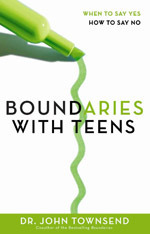 Read more about how to handle hot button topics effectively with a teen son or daughter in Boundaries with Teens.
Read more about how to handle hot button topics effectively with a teen son or daughter in Boundaries with Teens.
“Teen” image courtesy of David Castillo Dominici at FreeDigitalPhotos.net
The post Setting Boundaries with Teen Substance Abuse appeared first on Boundaries Books.
April 23, 2015
Overcome Five Obstacles to Creating Boundaries With Kids
If you’re new to this website, you may not be aware that there are 12 free teaching videos by Boundaries co-authors, Dr. Henry Cloud and Dr. John Townsend.
Today, we’re highlighting a really insight video that focuses on how to overcome five obstacles to creating boundaries with kids. If you’re a mother, father, grandparent, aunt, or uncle, this video will give you important insight to improve the way you interact with children.
Take the next 4 minutes to learn what you might be doing that could sabotage the benefits of boundaries with your kids. And, discover new ways to help your children, grandchildren, nieces, and nephews chart a course towards mature adulthood.

Click on the picture to view video:
Overcome Five Obstacles to
Creating Boundaries with Kids
To watch more of these insightful videos, click here.
The post Overcome Five Obstacles to Creating Boundaries With Kids appeared first on Boundaries Books.
April 20, 2015
Boundaries in Marriage Never Means Trying to Control Your Spouse
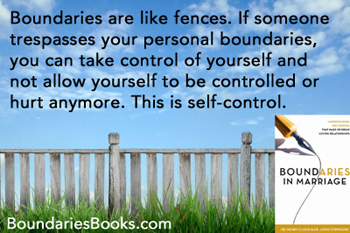 There is a lot of misunderstanding about boundaries, especially in the context of marriage. Some people are against boundaries because they see them as selfish. Other people actually use boundaries to be selfish. Both are wrong. Boundaries in marriage are basically about self-control.
There is a lot of misunderstanding about boundaries, especially in the context of marriage. Some people are against boundaries because they see them as selfish. Other people actually use boundaries to be selfish. Both are wrong. Boundaries in marriage are basically about self-control.
A client once said to me (Dr. Townsend), “I set some boundaries on my husband. I told him that he could not talk to me that way anymore. And it did not work. What do I do now?”
“What you have done is not boundaries at all,” I replied.
“What do you mean?”
“It was your feeble attempt at controlling your husband, and that never works.” I went on to explain that boundaries are not something you “set on” another person. Boundaries are about yourself.
My client could not say to her husband, “You can’t speak to me that way.” This demand is unenforceable. But she could say what she would or would not do if he spoke to her that way again. She could set a boundary “on herself.” She could say, “If you speak to me that way, I will walk out of the room.” This threat is totally enforceable because it has to do with her. She would be setting a boundary with the only person she could control: herself.
 When you build a fence around your yard, you do not build it to figure out the boundaries of your neighbor’s yard so that you can dictate to him how he is to behave. You build it around your own yard so that you can maintain control of what happens to your own property. Personal boundaries do the same. If someone trespasses your personal boundaries in some way, you can take control of yourself and not allow yourself to be controlled, or hurt, anymore. This is self-control.
When you build a fence around your yard, you do not build it to figure out the boundaries of your neighbor’s yard so that you can dictate to him how he is to behave. You build it around your own yard so that you can maintain control of what happens to your own property. Personal boundaries do the same. If someone trespasses your personal boundaries in some way, you can take control of yourself and not allow yourself to be controlled, or hurt, anymore. This is self-control.
And ultimately, self-control serves love, not selfishness. We hope that when you take control of yourself, you will love better and more purposefully and intentionally so that you and your spouse can have the intimacy you desire.
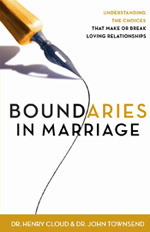 For more insights to improve the way you interact with your spouse, read Boundaries in Marriage.
For more insights to improve the way you interact with your spouse, read Boundaries in Marriage.
Image courtesy of anankkml via FreeDigitalPhoto.net
The post Boundaries in Marriage Never Means Trying to Control Your Spouse appeared first on Boundaries Books.
April 16, 2015
The Truth About Premarital Sex
 The Bible says in 1 Thessalonians 4:1 – 8 that God’s rule against sexual immorality is meant to preserve our lives, rather than take away our fun. Adhering to the rule keeps us pure and holy as we follow His will.
The Bible says in 1 Thessalonians 4:1 – 8 that God’s rule against sexual immorality is meant to preserve our lives, rather than take away our fun. Adhering to the rule keeps us pure and holy as we follow His will.
Sex outside of marriage affects us in destructive ways. We lose control of our own bodies and take advantage of each other. We become more interested in running after things that satisfy our own desires than in pursuing our relationship with God. That always hurts us. When we give 100 percent of our bodies to someone to whom we have not given 100 percent of our hearts, minds, and souls (as in marriage), then we are splitting our body and the rest of us. Sex outside of a commitment creates splits inside of people.
The body is doing something that the rest of the person has not fully bought into. A lack of obedience is inevitably self-destructive in some way. The Bible always teaches morality in the bigger context of hurting and rejecting God, hurting oneself, and hurting others. All three are named specifically in 1 Thessalonians 4:1 – 8. Obedience serves to protect our lives and ensure a good life. Rules of moral conduct are not killjoys. They are the principles that undergird success in every part of life…including sex.
 Find more insightful commentary from Drs. Henry Cloud and John Townsend in the NIV Life Journey Bible, which combines the world’s most accessible Bible translation with exclusive teaching.
Find more insightful commentary from Drs. Henry Cloud and John Townsend in the NIV Life Journey Bible, which combines the world’s most accessible Bible translation with exclusive teaching.
The post The Truth About Premarital Sex appeared first on Boundaries Books.
April 13, 2015
Boundaries With Kids: Your Child’s Pain Should Not Control Your Actions
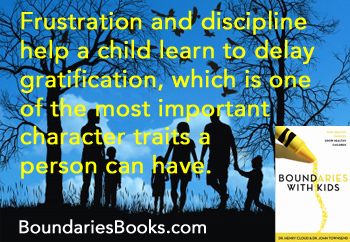 Boundaries with kids begins with parents having good boundaries of their own. Purposeful parents stay in control of themselves. If your child is controlling your decisions by protesting your boundaries, you are no longer parenting with purpose.
Boundaries with kids begins with parents having good boundaries of their own. Purposeful parents stay in control of themselves. If your child is controlling your decisions by protesting your boundaries, you are no longer parenting with purpose.
Terri was having problems with her thirteen-year-old son Josh not doing his homework. I helped her come up with a plan that would require Josh to set aside a certain time each night to do homework. During this hour Josh had to be in his study place with nothing else but his work, and he was not to do anything else but study. Terri had no control over whether or not Josh actually chose to study during that time. What she could control was that he do nothing else during that time but sit with his homework.
When I saw her the next time, Terri looked sheepish. She had not lived up to her end of the plan. “What happened?” I asked. “Well, we were all set, and then he got invited to go to a baseball game with his friend. I said no, that his hour was not up yet. But he got so upset, I could not talk him out of it. He seemed so mad and sad.”
“So,” I said, “that’s what he’s supposed to do, remember? He hates discipline. So what did you do next?”
“Well, I could see that this requirement was just making him too sad, and I could not stand it. So I let him go.” (Clue number one that a child will not develop self-control is when the parent does not have self-control in enforcing the rules.)
“What happened the next night?” I asked, already knowing the answer.
“He got upset again. It was a similar situation. He had an opportunity that would have been very sad to miss.”
“So let me get this straight. The way you are deciding what is right or not is by how he feels when he is required to do something. If he is upset, then you think it is the wrong thing to do. Is that right?”
“I haven’t thought about it that way, but I guess you’re right. I just can’t stand for him to be sad.”
“Then you have got to come to grips with a few important truths. One, your values are being set by the emotional reactions of an immature thirteen-year-old. Your value system’s highest guiding principle is whether or not Josh is upset. Two, you don’t value one of the most important aspects of child rearing: Frustration is a key ingredient to growth. The child who is never frustrated never develops frustration tolerance. Three, you are teaching him that he is entitled to always be happy and that all he has to do to get others to do what he wants is to cry about it. Are these really your values?”
She grew silent and began to realize what she was doing. To change, she had to commit to an important rule for setting boundaries with kids: A child’s protest does not define reality, or right from wrong. Just because your child is in pain does not mean that something bad is happening. Something good may be occurring, such as his coming to grips with reality for the first time. And this encounter with reality is never a happy experience. But if you can empathize with the pain and hold on to the limit, your child will internalize the limit and ultimately get over the protest.
 This is a law of the universe. Frustration and painful moments of discipline help a child learn to delay gratification, one of the most important character traits a person can have. If you are able to hold the limit and empathize with the pain, then character will develop. But if you don’t, you will have the same battle tomorrow. If you rescue your children from their anger at your boundary, you can plan on more anger at later limits. Remember, their protest or pain does not determine what is good.
This is a law of the universe. Frustration and painful moments of discipline help a child learn to delay gratification, one of the most important character traits a person can have. If you are able to hold the limit and empathize with the pain, then character will develop. But if you don’t, you will have the same battle tomorrow. If you rescue your children from their anger at your boundary, you can plan on more anger at later limits. Remember, their protest or pain does not determine what is good.
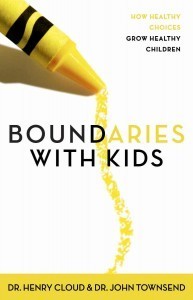 Learn how to instill the kind of character in your children that will lead to a balanced, productive, and fulfilling life in Boundaries with Kids.
Learn how to instill the kind of character in your children that will lead to a balanced, productive, and fulfilling life in Boundaries with Kids.
Family image courtesy of Vlado at FreeDigitalPhotos.net
The post Boundaries With Kids: Your Child’s Pain Should Not Control Your Actions appeared first on Boundaries Books.
April 2, 2015
God Models Boundaries
Isaiah 61:8 says, “For I, the Lord, love justice; I hate robbery and wrongdoing. In my faithfulness I will reward my people and make an everlasting covenant with them.”
This bible verse illustrates that God himself models boundaries and limits in his own character. He tells us clearly what he likes (justice) and what he hates (robbery and wrongdoing). God makes it clear where he stands on these issues. In a similar way, our words to others define our boundaries as we communicate our feelings, intentions or dislikes. This too is a form of justice.
It is difficult for people to know where we stand when we do not use words. For example, telling someone “I don’t like it when you raise your voice at me” gives the person we are speaking to a clear message about how we feel the relationship should be conducted.
The most basic boundary-setting word is “no.” It lets others know that we exist apart from them and that we are in control of ourselves. Being clear about our no — and our yes — is a theme that God models and a principle that is taught throughout the Bible (see Matthew 5:37; James 5:12). To speak the truth about a violation is an aspect of justice.
Question for Reflection:
What are some other examples in the Bible where God says “no”? Is there someone in your life that you need to tell “no” in order to improve the relationship, protect yourself, or express justice?
 If you love the “Boundaries” books, check out the NIV Life Journey Bible which combines the world’s most accessible Bible translation with exclusive teachings from Drs. Henry Cloud and John Townsend.
If you love the “Boundaries” books, check out the NIV Life Journey Bible which combines the world’s most accessible Bible translation with exclusive teachings from Drs. Henry Cloud and John Townsend.
The post God Models Boundaries appeared first on Boundaries Books.



